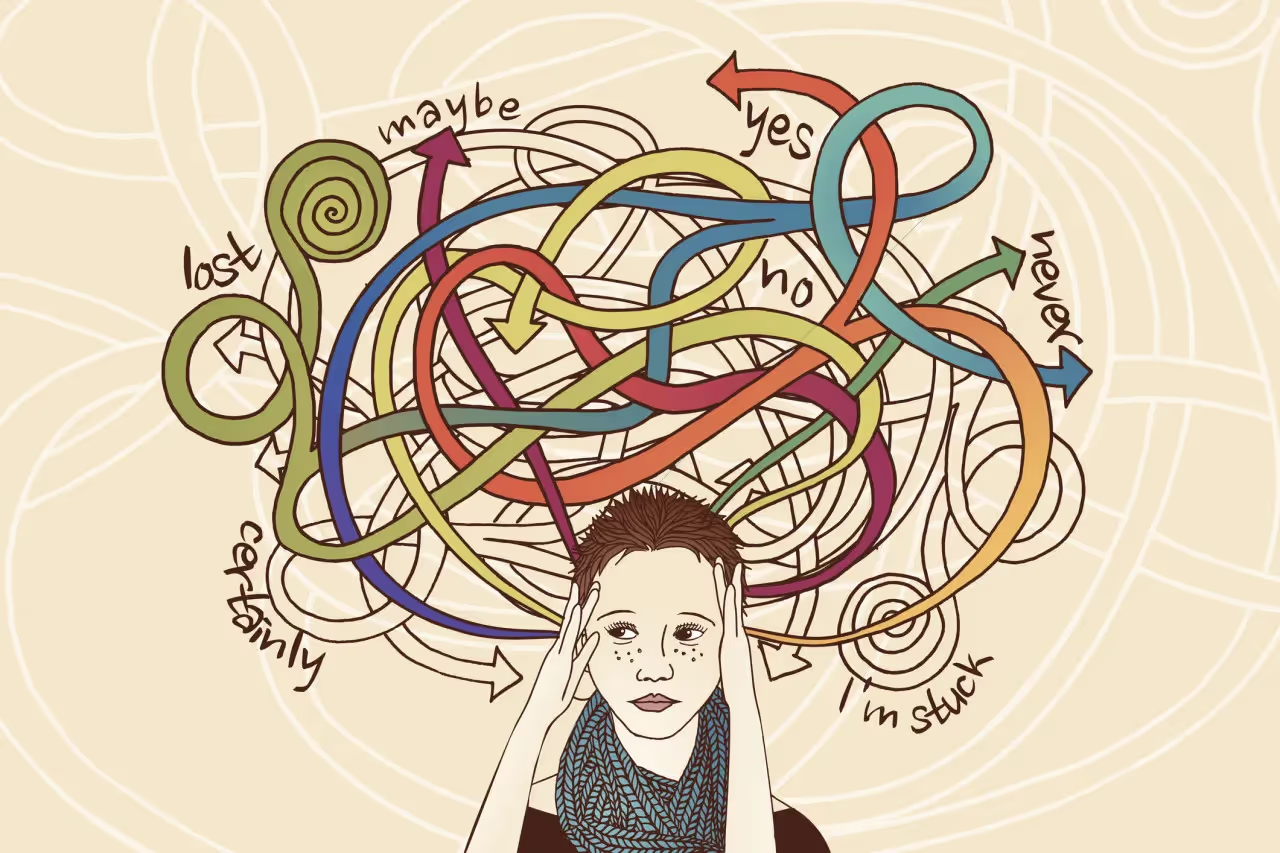Have you ever been told you think too much?I have, and to an extent it's true, I overthink, but I also believe that there are strengths to overthinking.It...

Have you ever been told you think too much?
I have, and to an extent it's true, I overthink, but I also believe that there are strengths to overthinking.
It makes me more considerate, more analytic, and more attentive to the emotions of others; this, as with many things in life, can be a very good thing, and also a very difficult thing.
Some of the more serious downsides to "overthinking" include mind-reading, people-pleasing, and of course, anxiety.
Mind-reading happens when you begin to think for the other person, or at least try to assume what someone else is thinking.
People-pleasing is a little more self-explanatory but involves a lot of caring about what others think while spending very little time caring about what you think.
Lastly, anxiety is all the worry that occurs about things that haven't happened and are a major cause for both people-pleasing and mind-reading.
Today we're going to look at overthinking and anxiety to better understand how to keep the pros and ditch the cons of overthinking.
To start, let's look at the relationship between overthinking and anxiety.
Overthinking and anxiety are like two peas in a pod.
Why?
Because when you think a lot, you notice a lot, or at least you think you notice a lot.
You notice more things that could go wrong, which means more potential for being hurt or hurting someone else, as well as seeing and hearing all the things that no one else seems to be paying attention to.
This can also lead to overstimulation where you are taking in more information than you can handle through your senses which increases the anxiety you already had from being so attentive in the first place.
Above I stated, at least you think you notice a lot; think being the keyword.
Anxiety is fueled by thoughts, your thoughts about the situations you find yourself in, so if you can remove the thoughts (you overthinker) then you remove anxiety.
And therein lies the difference between noticing and thinking.
If you truly notice things, there's not much thought about; when you notice another group of people at a table across from yours at dinner you simply see them and what they're doing.
Anxiety is only created when you begin to think about what they must be talking about, if they glance at you then you start to think they must be thinking about you, and the worry takes over.
Be mindful of the thoughts you create that begin as simple harmless observations.
Easier said than done of course so let's look at how to stop thinking when you want to.
As I mentioned in the first paragraph describing overthinking and anxiety, several positive qualities come with being an overthinker.
That's why this section is specifically about stopping your thoughts when you WANT to.
AKA when your anxiety starts running the show.
The trick is, to pay attention and ask questions!
See, the downside of overthinking is that you start to think FOR other people.
This is called "mind-reading."
Find out from the other person what they're thinking before you think of all the outcomes and decide whether the worst one is true.
Your thoughts exist in this giant cloud while the rest of reality is happening in real-time in front of you.
Don't let that cloud pull you into outer space.
Pay attention to the here and now.
When you start to feel anxious, focus on your breathing, long exhales will calm you down in less than a minute.
Remember how we talked about noticing versus thinking, this is exactly where that comes into play.
The key to noticing something is to remove the judgment that you place on the observation.
Let the observation stop at, "Oh, this is happening" instead of "This is happening and it's terrible and they're all laughing at me, and…" get the picture?
If overthinking and anxiety are getting the best of you when you're with someone, pay attention to what they're saying to you, and ask them questions instead of making assumptions.

Overthinking and anxiety are so hard to deal with but even harder to change.
Why? Why does it have to be so hard?
Because you have spent years, if not decades, reinforcing that pattern that makes you see the worst case in a given situation and that it's better to believe the worst case than to challenge it.
Changing something that is that ingrained takes a lot of time and conscious effort, but it can be done.
And the more you do it, the easier it gets.
Think of your brain like a garden, and for your whole life that garden has been growing tons of weeds that completely overshadow the flowers and plants that you love.
Using things like mindfulness will help you slowly start removing those weeds a little bit at a time.
But the thing is, even when you remove all (or at least most) of the weeds, they will come back if you don't continue to take care of the way you think.
Don't get discouraged, all change is hard if it's a change worth making, and this is one change that is worth making.
Overthinking and anxiety don't have to ruin your life, and you certainly don't have to continue experiencing roadblocks that prevent you from having the life that you want.
Work at it, bring yourself down into the present moment, and practice, practice, practice, I know you can do it.
Overthinking and anxiety do go hand-in-hand, unfortunately.
But, the good news is you can change your patterns by being more mindful of the here and now, asking questions, and paying close attention.
Notice your surroundings, and be attentive, but don't let your observations develop into judgments and mind-reading- that's where the anxiety loves to flourish.
It's easy to let your mind think for others, but it's better to find out for certain what others are thinking by asking them directly.
Utilizing breathing techniques with long exhales to calm your nervous system down will decrease the intensity of anxiety and allow you to collect yourself and make it through any situation.
And of course, practice practice practice.
Remember, your mind is like a garden, and the weeds are tall and thick, but with some practice and patience you can start removing those weeds and get to the good stuff.
Being an overthinker has its merits, and with a little more focused direction and you can hold on to those merits without being controlled by the baggage that often comes with it.
Ignoring anxiety can exacerbate symptoms and make it more challenging to manage over time. This can result in a negative impact on your personal, professional, and social life, leading to feelings of isolation and even depression.
Addressing anxiety is crucial because it can significantly impact your quality of life and overall well-being. Left untreated, anxiety can lead to more severe mental health issues, relationship problems, and difficulty functioning in daily life.
Other activities which have been found helpful in reducing both immediate feelings of anxiousness and long-term anxieties associated with chronic disorders include yoga, journaling, nature walks, art therapy, volunteering, and other low-stress activities. Additionally, developing a healthy lifestyle incorporating adequate sleep, physical activity, and nutritious meals can help reduce overall stress levels.
Yes, Medicaid provides insurance coverage for therapy services specifically designed to help individuals struggling with anxiety, depression, and other mental health conditions.
It's important that you feel comfortable discussing personal matters with your therapist in order to open up and get more out of therapy sessions; therefore finding someone who meets certain criteria like experience level, expertise areas, and personality is key when selecting a therapist who can give meaningful feedback about how best handle issues related to anxiety or other mental health concerns.
To reduce your anxiety, you can practice relaxation techniques such as deep breathing, progressive muscle relaxation, guided imagery, and mindfulness practices. Additionally, regular exercise has been found to be beneficial in managing stress and improving mental health.